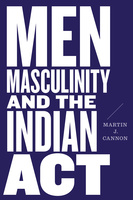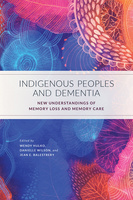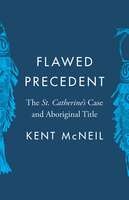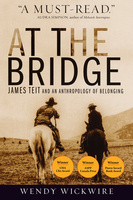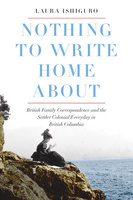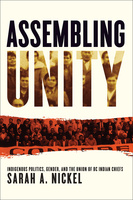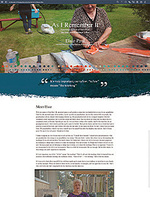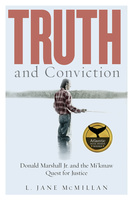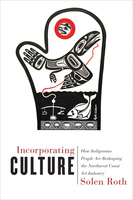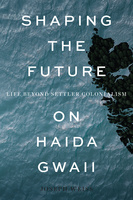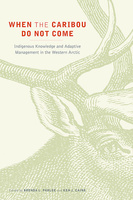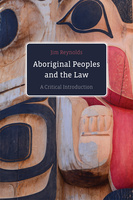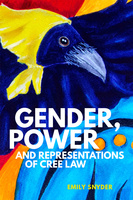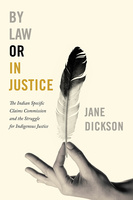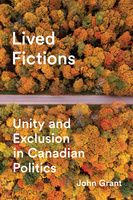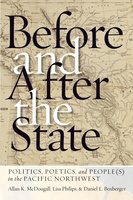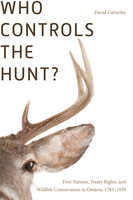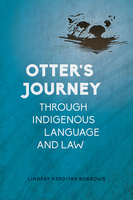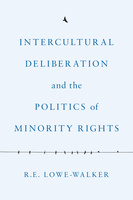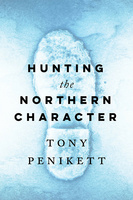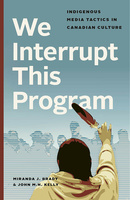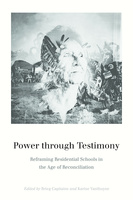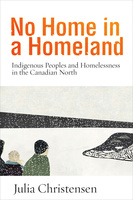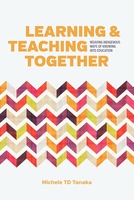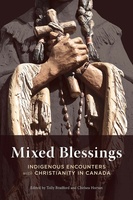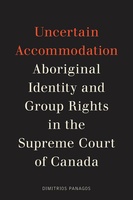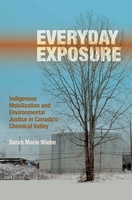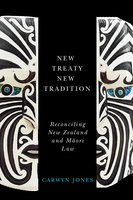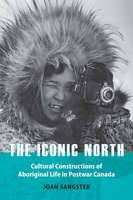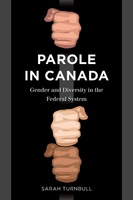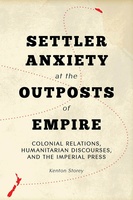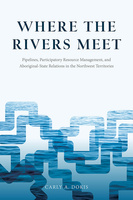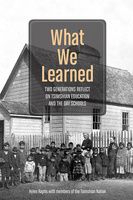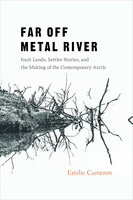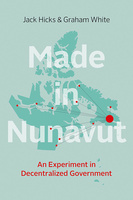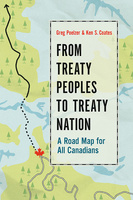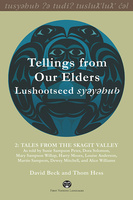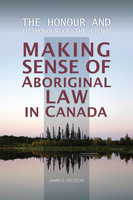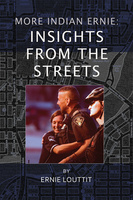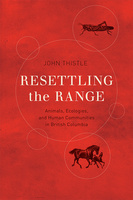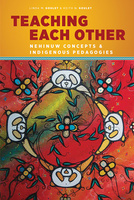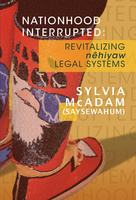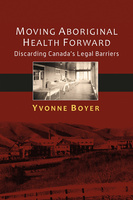Men, Masculinity, and the Indian Act
Men, Masculinity, and the Indian Act reverses conventional thinking to argue that the sexism directed at women within the act in fact undermines the well-being of all Indigenous people, proposing that Indigenous nationhood cannot be realized or reinvigorated until this broader injustice is understood.
Indigenous Peoples and Dementia
New Understandings of Memory Loss and Memory Care
Indigenous People and Dementia brings together research and Indigenous knowledge on memory loss and memory care in later life to assist students, practitioners, and educators to decolonize their work with Indigenous peoples.
Flawed Precedent
The St. Catherine’s Case and Aboriginal Title
This illuminating account of the St. Catherine’s case of the 1880s reveals the erroneous assumptions and racism inherent in judgments that would define the nature and character of Aboriginal title in Canadian law and policy for almost a century.
At the Bridge
James Teit and an Anthropology of Belonging
At the Bridge lifts from obscurity the story of James Teit (1864–1922), an outstanding Canadian ethnographer and Indian rights activist whose thoughtful scholarship and tireless organizing have been largely ignored.
Métis Politics and Governance in Canada
This timely book offers a novel, practical guide for understanding who the Métis are and the challenges they face on the path to self-government.
Nothing to Write Home About
British Family Correspondence and the Settler Colonial Everyday in British Columbia
The first substantial study of family correspondence and settler colonialism, Nothing to Write Home About elucidates the significance of trans-imperial intimacy, epistolary silence, and the everyday in laying the foundations of settler colonialism in British Columbia.
Assembling Unity
Indigenous Politics, Gender, and the Union of BC Indian Chiefs
Assembling Unity traces the history of pan-Indigenous unity in British Columbia through political negotiations, gendered activism, and the balance and exercise of power.
As I Remember It
Teachings (Ɂəms tɑɁɑw) from the Life of a Sliammon Elder
Meet Elder Elsie Paul and discover her stories, family history, and teachings – ʔəms tɑʔɑw – in a multimedia, online book that captures the wit and wisdom of her storytelling.
Truth and Conviction
Donald Marshall Jr. and the Mi’kmaw Quest for Justice
A passionate account of how one man’s fight against racism and injustice transformed the criminal justice system and galvanized the Mi’kmaw Nation’s struggle for self-determination, forever changing the landscape of Indigenous rights in Canada and around the world.
Incorporating Culture
How Indigenous People Are Reshaping the Northwest Coast Art Industry
Incorporating Culture examines what happens when Indigenous people assert control over the commercialization of their art by instilling the market with their communities’ values.
Shaping the Future on Haida Gwaii
Life beyond Settler Colonialism
Countering colonial ideas about Indigenous peoples being frozen in time and without a future, this provocative book explores the ways in which members of the Haida Nation are shaping myriad possible futures to address the dilemmas that come with life under settler colonialism.
When the Caribou Do Not Come
Indigenous Knowledge and Adaptive Management in the Western Arctic
When the Caribou Do Not Come highlights the knowledge and perspectives of northern Canadian communities that have been dealing with caribou population fluctuations for generations.
Aboriginal Peoples and the Law
A Critical Introduction
This introduction to contemporary Aboriginal law lays the groundwork for any assessment of Canada’s claim to be a just society for Indigenous peoples.
Gender, Power, and Representations of Cree Law
This powerful book investigates the relationship between the oversimplification of gender in representations of Cree law and its effect on perceptions of Indigenous women as legal agents and citizens.
By Law or In Justice
The Indian Specific Claims Commission and the Struggle for Indigenous Justice
This insider’s account of the work of the Indian Specific Claims Commission takes an unflinching look at the development and implementation of Indigenous claims policy from 1991 to 2009.
Practising Community-Based Participatory Research
Stories of Engagement, Empowerment, and Mobilization
Researchers engaged in community-based participatory research share stories about their work with marginalized communities, offering insights and imparting valuable lessons that will inspire others doing research with an eye to social justice.
Lived Fictions
Unity and Exclusion in Canadian Politics
Bringing big thinking back to Canadian politics, Lived Fictions demonstrates how theories of political unity always exclude and shows why our comfortable assumptions about the promises of Canadian politics mask historical failures.
Before and After the State
Politics, Poetics, and People(s) in the Pacific Northwest
Documenting the profound impact of state formation on individuals and communities in the Pacific Northwest of the nineteenth century, Before and After the State reveals how national narratives and constructed identities were used in the service of nation building.
Who Controls the Hunt?
First Nations, Treaty Rights, and Wildlife Conservation in Ontario, 1783-1939
Tracing the connections between colonialism and the early conservation movement in Ontario, Who Controls the Hunt? examines the contentious issue of treaty hunting rights and the impact of conservation laws on First Nations.
Otter’s Journey through Indigenous Language and Law
Told in contemporary Anishinaabe storytelling style, Otter’s Journey takes us across the globe to explore how the work in Indigenous language revitalization can inform the emerging field of Indigenous legal revitalization.
The Creator’s Game
Lacrosse, Identity, and Indigenous Nationhood
The Creator’s Game serves as a potent illustration of how, for over a century, the Indigenous game of lacrosse has served as a central means for Indigenous communities to activate their self-determination and reformulate their identities.
Intercultural Deliberation and the Politics of Minority Rights
A unique contribution to the literature on minority rights, Intercultural Deliberation and the Politics of Minority Rights examines the role of cultural difference in minority rights claims, building a case for inclusive political deliberation in liberal democracies.
Hunting the Northern Character
This deeply personal account of recent developments in the Canadian North tells the story of a region that leaders in Oslo, Ottawa, Moscow, and Washington often refuse to see and that only insiders fully know.
We Interrupt This Program
Indigenous Media Tactics in Canadian Culture
Powerful and inspiring, We Interrupt This Program brings to light a new facet of Indigenous sovereignty – the use of media tactics to infuse Canadian culture with Indigenous perspectives and to raise political and cultural consciousness in Indigenous communities.
The Equity Myth
Racialization and Indigeneity at Canadian Universities
Challenging the myth of equity in higher education, this is the first comprehensive, data-based study of racialized and Indigenous faculty members’ experiences in Canadian universities.
Power through Testimony
Reframing Residential Schools in the Age of Reconciliation
This groundbreaking volume assesses the power of residential school survivors to reframe – through memory, story, and testimony – how Canadians think about residential schools and their long-term impact on individuals, families, communities, and the nation.
No Home in a Homeland
Indigenous Peoples and Homelessness in the Canadian North
Through personal accounts and analysis of historical trends, No Home in the Homeland documents the spread of homelessness in the North, what it reveals about colonialism and its legacies, and the limitations of existing policies and programs.
Learning and Teaching Together
Weaving Indigenous Ways of Knowing into Education
An inspirational account of how a group of pre-service teachers, working alongside Indigenous wisdom keepers in British Columbia, developed an indigenist approach to education that can be applied in a wide variety of classrooms.
Mixed Blessings
Indigenous Encounters with Christianity in Canada
This diverse and cutting-edge collection offers fresh insights into the complex and charged subject of Indigenous encounters with Christianity in Canada from the 1600s to the present day.
Uncertain Accommodation
Aboriginal Identity and Group Rights in the Supreme Court of Canada
A bold analysis of what happened when Canada attempted to extend group rights to Aboriginal people in the early 1980s and why it went wrong.
Everyday Exposure
Indigenous Mobilization and Environmental Justice in Canada’s Chemical Valley
Everyday Exposure documents the adverse health effects experienced by Aamjiwnaang citizens in the heart of Canada’s Chemical Valley and argues for a transformative and experiential “sensing policy” approach that takes the voices and experiences of Indigenous citizens seriously.
New Treaty, New Tradition
Reconciling New Zealand and Maori Law
Maori author and legal scholar Carwyn Jones provides a nuanced analysis, enhanced by storytelling, of the New Zealand land claims process to draw attention to the cultural implications of Indigenous self-determination, settlement negotiations, and reconciliation projects around the globe.
White Settler Reserve
New Iceland and the Colonization of the Canadian West
This innovative history of a reserve for Icelandic settlers connects the dots between immigration and Indigenous dispossession in western Canada.
The Iconic North
Cultural Constructions of Aboriginal Life in Postwar Canada
The Iconic North explores how the “modern” South crafted cultural images of a “primitive” North that reflected its own preconceived notions and social, political, and economic interests.
Parole in Canada
Gender and Diversity in the Federal System
Parole in Canada explores how concerns about aboriginality, gender, and the multicultural ideal of “diversity” have altered parole policy and practice – and asks whether these changes go far enough.
Settler Anxiety at the Outposts of Empire
Colonial Relations, Humanitarian Discourses, and the Imperial Press
A fascinating look at how humanitarian language was used by the colonial press in New Zealand and on Vancouver Island to justify ongoing settler expansion while allaying fears of Indigenous resistance.
Fragile Settlements
Aboriginal Peoples, Law, and Resistance in South-West Australia and Prairie Canada
Fragile Settlements compares the historical processes through which British colonial authority was asserted over Indigenous people in southwest Australia and prairie Canada from the 1830s to the early twentieth century.
Where the Rivers Meet
Pipelines, Participatory Resource Management, and Aboriginal-State Relations in the Northwest Territories
An examination of Sahtu Dene participation in the assessment of the Mackenzie Gas pipeline and other resource extraction projects, this book provides an in-depth account of the workings and effects of participatory environmental assessment in the Canadian North and its implications for the legitimization of resource co-management.
What We Learned
Two Generations Reflect on Tsimshian Education and the Day Schools
Moving beyond the more familiar stories of residential schools, two generations of Tsimshian students recall their experiences attending day and public schools in northwestern British Columbia.
Far Off Metal River
Inuit Lands, Settler Stories, and the Making of the Contemporary Arctic
Drawing on the story of the 1771 Bloody Falls massacre, human geographer Emilie Cameron explores the relationship between stories and colonialism, challenging readers to examine their perceptions of the contemporary Arctic and its peoples.
Made in Nunavut
An Experiment in Decentralized Government
Made in Nunavut provides a definitive account of how an innovative government was designed and implemented in Canada’s Eastern and Central Artic.
From Treaty Peoples to Treaty Nation
A Road Map for All Canadians
From Treaty Peoples to Treaty Nation is essential reading for all Canadians who want to understand how Canadian political and economic systems can accommodate Aboriginal aspirations and ensure a better future for all Canadians.
Tellings From Our Elders: Lushootseed syeyehub
The Complete Two-Volume Set
Twenty-seven traditional Lushootseed stories are presented in this two-volume set, complete with English translations and interlinear grammatical analyses.
Tellings from Our Elders
Lushootseed syeyehub, Volume 2: Tales from the Skagit Valley
Nine traditional stories from the Skagit Valley, presented with line-by-line interlinear glosses, illuminate the grammatical and narrative richness of the Lushootseed language
The Honour and Dishonour of the Crown
Making Sense of Aboriginal Law in Canada
Unique within Canadian legal writing, this book unpacks the complex conceptual differences between the fiduciary duty of the Crown and the honour of the Crown.
More Indian Ernie
Insights from the Streets
Retired Police Sergeant Ernie Louttit heads back to the streets in his second book, giving readers a rare glimpse of the realities a street cop faces dealing with prostitutes, street gangs, drunk drivers, and other offenders.
Resettling the Range
Animals, Ecologies, and Human Communities in British Columbia
This unconventional history looks at the resettlement of interior British Columbia from the perspective of campaigns to exterminate grasshoppers and wild horses, creatures considered by some to be pests.
Teaching Each Other
Nehinuw Concepts and Indigenous Pedagogies
Drawing on Nehinuw (Cree) educational concepts, this book provides a new theoretical and practical model for teaching Indigenous students.
Nationhood Interrupted
Revitalizing nêhiyaw Legal Systems
Co-founder of the international movement Idle No More, Sylvia McAdam shares nêhiyaw (Cree) laws so that future generations may understand and live by them, revitalizing Indigenous nationhood.
Moving Aboriginal Health Forward
Discarding Canada’s Legal Barriers
This comprehensive analysis of Aboriginal health statistics, historical practices, and legal principles in Canadian law provides a practical framework for the reconciliation of Aboriginal health and healing practices within Canadian society.

